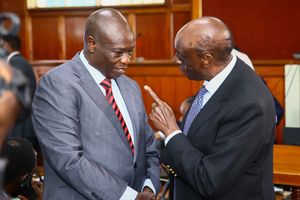More women being sexually abused by their partners, shows survey

The survivors expressed frustration and lack of support when seeking formal services, with the majority of the women citing a lack of trust in police and healthcare services for GBV response.
What you need to know:
- The survivors expressed frustration and lack of support when seeking formal services.
One in four women surveyed across four counties reported experiencing physical, sexual, or emotional abuse from their partners.
The survey, conducted by Performance Monitoring for Action, Agile 2 in collaboration with the Ministry of Health, covered Bungoma, Kakamega, West Pokot and Kiambu counties.
It revealed that out of about 4,000 women in four counties - 40 per cent - reported a form of violence from their partners. Most of the women from the 23,588 households were aged 15 to 49 years and married at the time of the survey.
In Kakamega, 50 per cent of the 799 women surveyed reported sexual abuse. In Bungoma, 47 per cent of the 820 women reported abuse, while in West Pokot, 43 per cent of the 899 women surveyed experienced abuse. In Kiambu, 25 per cent of the 803 women reported cases of violence.
“When he requests for sexual intercourse and you are not in the mood, he insults you and asks: “do you know I paid dowry for you?” So, you are forced to do it unwillingly. If you are hesitant, he can even beat you up,” says a 27-year-old responder from, West Pokot.
The report collected between May and July 2024 reported that 47 per cent of the respondents reported sexual harassment, with 34 per cent saying someone made unwanted sexual comments, jokes or gestures toward them.
Thirty eight per cent reported that someone stared at them suggestively while 21 per cent said someone touched them in a way that made them feel uncomfortable.
Kakamega County led with 54 per cent of women experiencing sexual harassment followed by Kiambu at 47 per cent, Bungoma at 44 per cent and West Pokot at 30 per cent.
According to the Kenya Demographic Health Survey, 2022, 34 per cent of women ages 15-49 have experienced physical violence since age 15.
The government has committed to ending gender-based violence (GBV) by 2026 as part of its global co-leadership of Generation Equality’s Action Coalition, and Kenya has a robust legal framework surrounding gender-based violence, with myriad laws that, if effectively enforced, could significantly reduce such violence.
However, even with glaring numbers, less than one in four survivors sought help from formal services, with West Pokot leading in the number of women seeking help. In the county, only 13 per cent sought help in shelter services, five per cent from police, traditional healers 11 per cent, legal three per cent, medical services 23 per cent and counselling 19 per cent.
In Kakamega County, seven per cent sought help in shelter services, two per cent from police, traditional healers two per cent, three per cent sought help legally, medical services 12 per cent and counselling 16 per cent.
In Bungoma, three per cent sought help in shelter services, four per cent from police, traditional healers one per cent, legal two per cent, medical services nine per cent and counselling seven per cent.
In Kiambu County, three per cent sought help in shelter services, two per cent from police, traditional healers one per cent, none sought legal help, medical services six per cent and counselling four per cent.
The survivors expressed frustration and lack of support when seeking formal services, with the majority of the women citing a lack of trust in police and healthcare services for GBV response.
Only about a quarter of survivors sought help from a formal service, with medical services, followed by counselling being the most common services sought.
Another respondent reported: “I believe that if 72 hours have not elapsed, you can be helped in case you have contracted a disease. But when I reached the hospital, they told me it was a police case and that I must involve them. I was directed to the police station, where the officers told me to go back to the hospital, then later return home. I excepted to be helped further. But imagine you walk around and see this person who sexually abused you walking freely. Nothing has been done to him. This hurts a lot.”
“Lack of trust and support in service providers continues to be a barrier for women seeking formal help. Only a quarter of survivors spoke informally with another person about their experience,” said Prof Michele Decker while presenting the study findings.
She said the data was important since there was a need to understand issues in order to programme policies that are responsive in the space.
Overall, only 21 per cent of respondents had confidence in police services for GBV, with Kakamega and West Pokot recording a tie of 22 per cent and Kiambu and Bugoma counties at 21 per cent.
“Some police officers will want to sleep with you so they can help you. If if you refuse, you continue to suffer. You eventually give up seeking justice,” said a 33-year-old participant.
Another respondent from Kakamega said: “When doctors ask you what happened, you lie that you hit yourself because if you say that your husband beat you up,, it’s shameful and the doctors might laugh at you.”
The survey also indicated that overall, 30 per cent of women experienced technological abuse, with 17 per cent reporting that their partners looked at their phones without their permission, 17 per cent were repeatedly asked where they were or what they were doing through texts, with four per cent forced to reveal their M-Pesa details, password or history on their phones.





